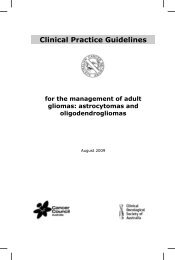Clinical Practice Guidelines for the management of locally advanced ...
Clinical Practice Guidelines for the management of locally advanced ...
Clinical Practice Guidelines for the management of locally advanced ...
You also want an ePaper? Increase the reach of your titles
YUMPU automatically turns print PDFs into web optimized ePapers that Google loves.
<strong>the</strong> median overall survival <strong>for</strong> patients with castrate-resistant prostate cancer is now 18 months from<br />
<strong>the</strong> start <strong>of</strong> chemo<strong>the</strong>rapy. 14 It is <strong>of</strong> note that <strong>the</strong> median overall survival is detailed to be about 12<br />
months from institution <strong>of</strong> second-line hormone manipulation in <strong>the</strong> studies listed. These studies were<br />
done prior to <strong>the</strong> demonstrated benefit <strong>of</strong> docetaxel <strong>for</strong> patients with castrate-resistant prostate cancer.<br />
Specifically, prior studies have shown mitoxantrone plus prednisone was associated with a better<br />
palliative response than <strong>the</strong> prednisone (low-dose corticosteroid) alone. It is also <strong>of</strong> note that in <strong>the</strong><br />
pivotal docetaxel plus prednisone versus mitoxantrone plus prednisone studies 14 , patients had a<br />
median <strong>of</strong> four previous hormone manipulations, indicating common use <strong>of</strong> hormone manipulations<br />
prior to trialling chemo<strong>the</strong>rapy. It is <strong>of</strong> relevance to point out <strong>the</strong> ‘clock’ <strong>for</strong> <strong>the</strong> median overall<br />
survival <strong>of</strong> about 18.5 months <strong>for</strong> docetaxel and 16.4 months <strong>for</strong> mitoxantrone started from when <strong>the</strong><br />
chemo<strong>the</strong>rapy was given (ie after <strong>the</strong> hormone manipulations). It is also worth noting that more<br />
recently, agents which (i) block <strong>the</strong> <strong>for</strong>mation <strong>of</strong> testosterone from cholesterol by inhibiting an<br />
enzyme known as 17-hydroxylase/17,20 lyase (abiraterone), and (ii) are more potent antagonists <strong>of</strong><br />
<strong>the</strong> androgen receptor, have been shown to cause disease regression as single agents in <strong>the</strong> postchemo<strong>the</strong>rapy<br />
setting. These agents are being assessed in patients with castrate-resistant disease (<strong>for</strong><br />
example <strong>the</strong> NCT00638690 or COU-AA-301 trial <strong>of</strong> abiraterone acetate). These are well-powered<br />
studies and will provide important in<strong>for</strong>mation about <strong>the</strong> utility <strong>of</strong> second-line hormone manipulations<br />
in patients with castrate disease.<br />
Evidence summary Level References<br />
Data from large randomised studies are limited.<br />
No second-line hormone manipulation in an RCT has been clearly<br />
shown to lead to an improvement in overall survival.<br />
A minority <strong>of</strong> patients have prolonged disease control with fur<strong>the</strong>r<br />
hormone manipulations such as an anti-androgen or adrenal<br />
androgen suppression with ketoconazole and hydrocortisone<br />
In one RCT, overall quality <strong>of</strong> life scores, pain scores and<br />
gastrointestinal symptom scores were significantly better with<br />
prednisone compared with flutamide.<br />
II 2-11, 15-17<br />
When assessing <strong>the</strong> data in total and in <strong>the</strong> context <strong>of</strong> <strong>the</strong> role <strong>of</strong> docetaxel (active chemo<strong>the</strong>rapy), a<br />
recommendation <strong>of</strong> a course <strong>of</strong> action can be made <strong>for</strong> patients with evidence <strong>of</strong> progression on<br />
androgen deprivation.<br />
Recommendation<br />
There is a sequence <strong>of</strong> actions that should be followed when a patient is shown to have<br />
progressive cancer on androgen deprivation <strong>the</strong>rapy. First, confirm that <strong>the</strong> patient has a<br />
castrate level <strong>of</strong> testosterone if on an LHRH agonist <strong>the</strong>rapy. If <strong>the</strong> patient is also on a nonsteroidal<br />
anti-androgen, this agent could be withdrawn and observed <strong>for</strong> <strong>the</strong> possibility <strong>of</strong> an<br />
anti-androgen withdrawal phenomenon. It is reasonable to trial fur<strong>the</strong>r hormone<br />
manipulations if <strong>the</strong> patient is asymptomatic or minimally symptomatic prior to use <strong>of</strong><br />
chemo<strong>the</strong>rapy (e.g. docetaxel).<br />
Grade C<br />
Bisphosphonates, radio<strong>the</strong>rapy and chemo<strong>the</strong>rapy will need to be integrated at some time into overall<br />
treatment regimens at this stage <strong>of</strong> <strong>the</strong> disease.<br />
77<br />
Castration-resistant prostate cancer



